2025 Midwest C. elegans Meeting
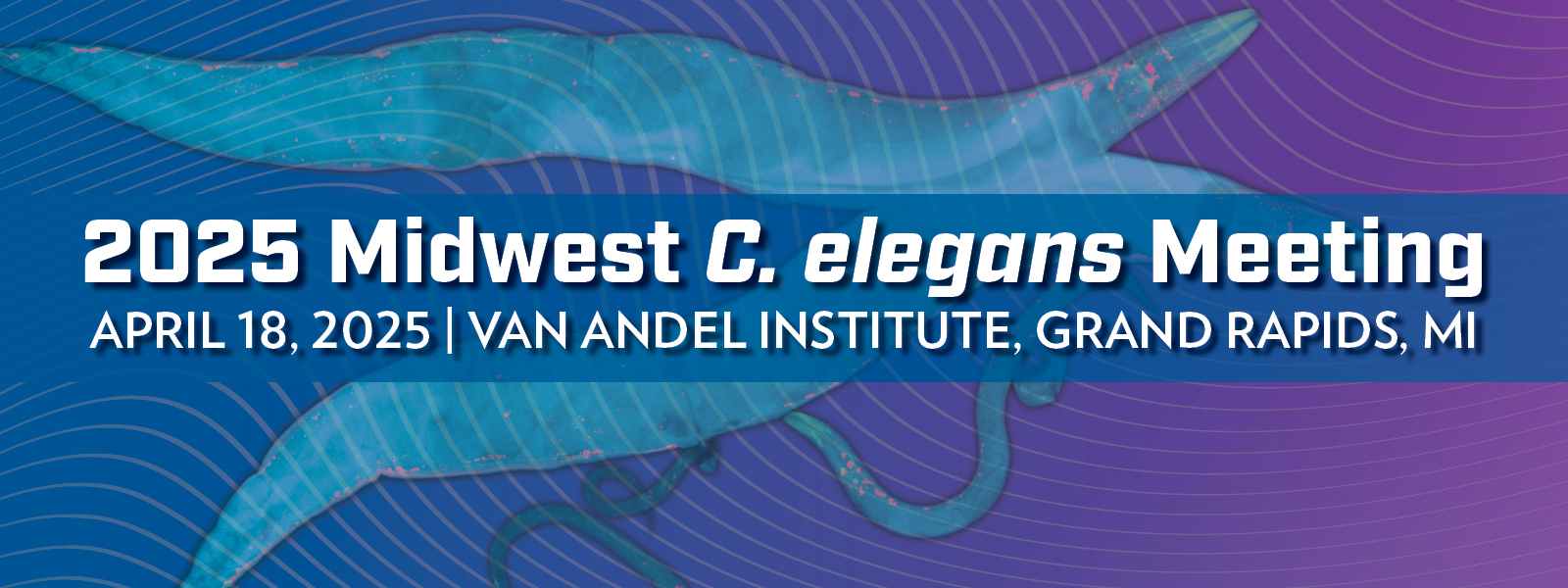
The 2025 Midwest C. elegans Meeting will be held April 18, 2025, at Van Andel Institute in Grand Rapids, Michigan. The program will feature a keynote by Frank C. Schroeder, Ph.D., of Cornell University, talks by researchers across the C. elegans field and a poster session.
Breakfast
Opening Remarks
Keynote Address
Boyce Thompson Institute and Cornell University
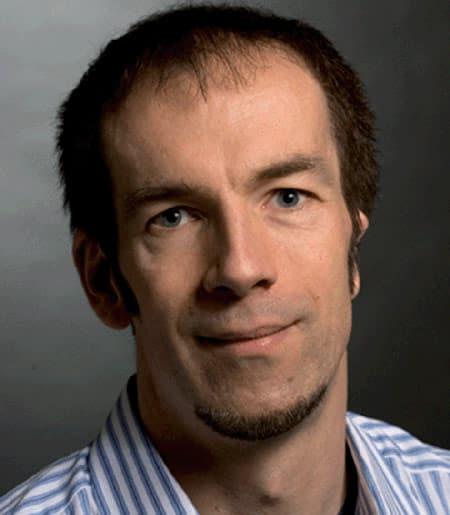
Host-microbe metabolic interactions in C. elegans and mouse
Break
Session One
10:25 amPeter Kropp, Ph.D.
Assistant Professor of Biology, Kenyon College

The mitochondrial Trans-2 Enoyl-CoA reductase is necessary for oogenesis in C. elegans
Mirella Hernandez, M.S.
Ph.D. Candidate, University of Michigan

C. elegans and mortality: How death perception affects health- and lifespan
Bianca Pereira, M.Sc.
Graduate Student, Department of Biological Sciences, Wayne State University

Innexin CHE-7 modulates insulin signaling to promote survival and reproductive growth
Xiao Wang
Ph.D. Student, Van Andel Institute Graduate School
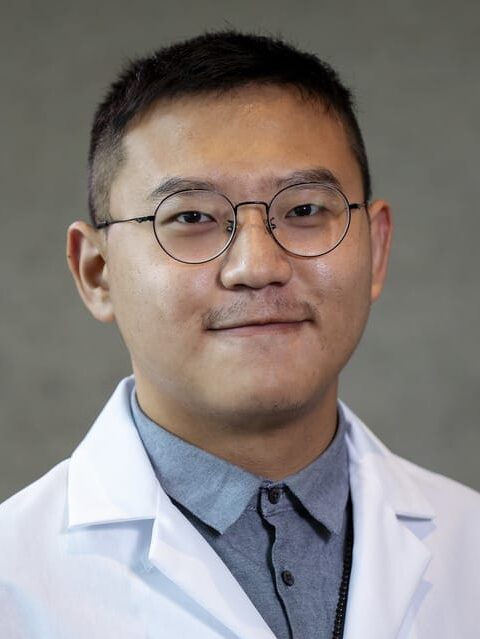
Pseudomonas lurida promotes C. elegans development through GacA/GacS-dependent synthesis of massetolide E
Lunch
Poster Session
Session Two
1:55 pmDr. Vladimir Lažetić, Ph.D., DVM
Assistant Professor, The George Washington University
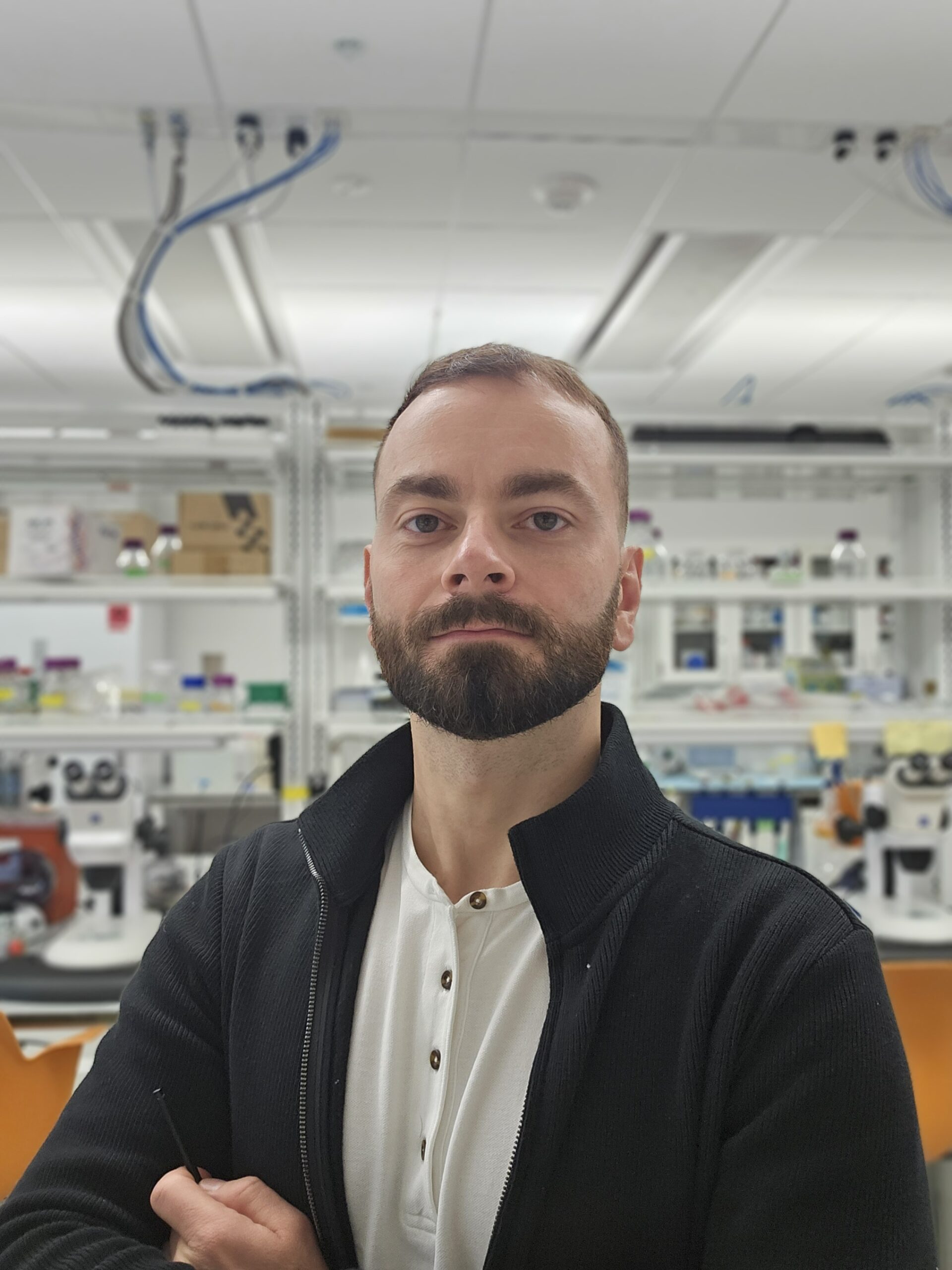
Stenotrophomonas indicatrix promotes innate immune response against intracellular pathogens in Caenorhabditis elegans
Elizabeth Kitto, B.S.
Ph.D. Candidate, University of Michigan, Ann Arbor
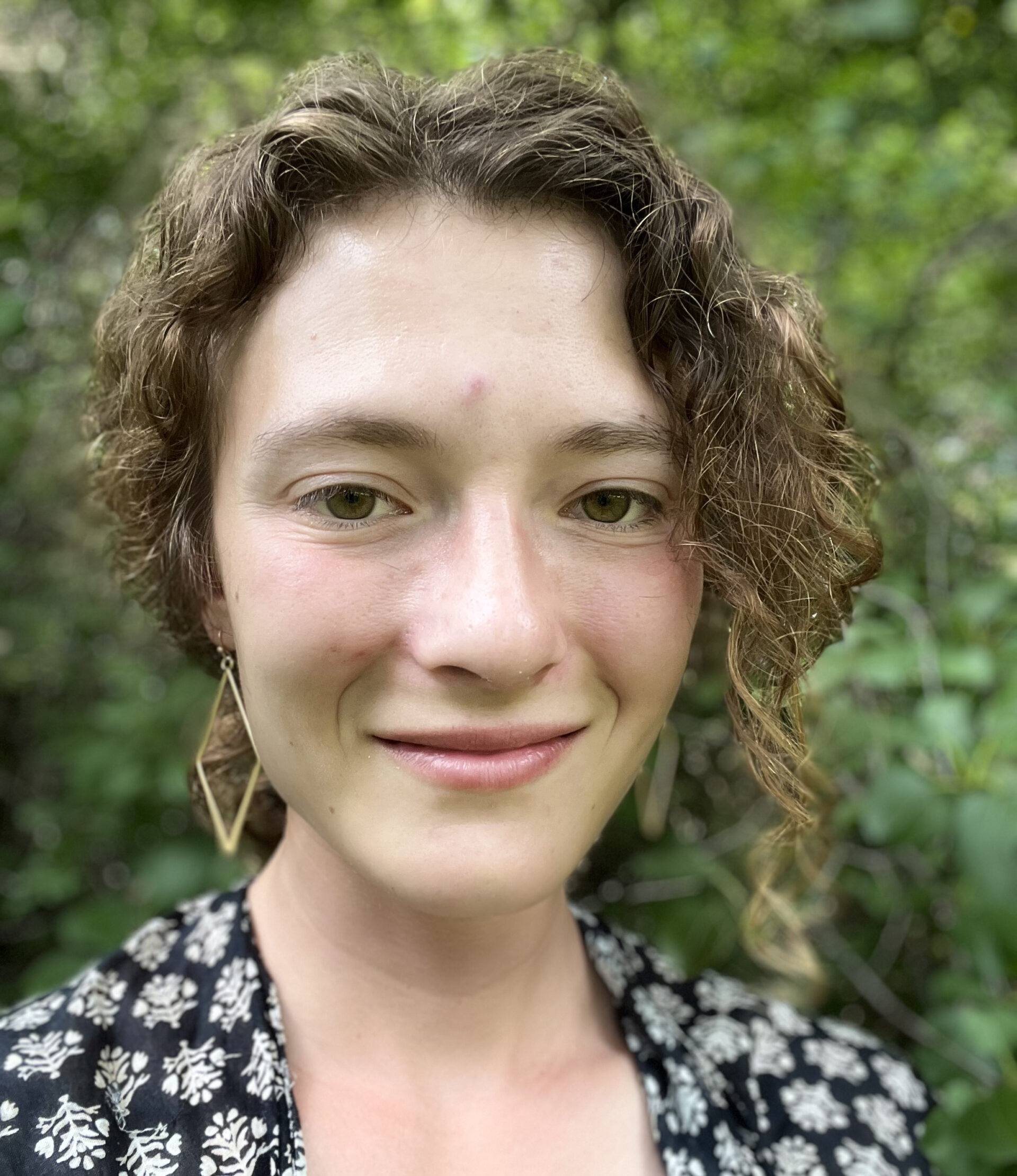
Metabolic regulation of behavior by the intestinal enzyme fmo-2
Aidan James Reynolds, B.S.
Ph.D. Candidate in Analytical Chemistry, Qiu Lab, Michigan State University
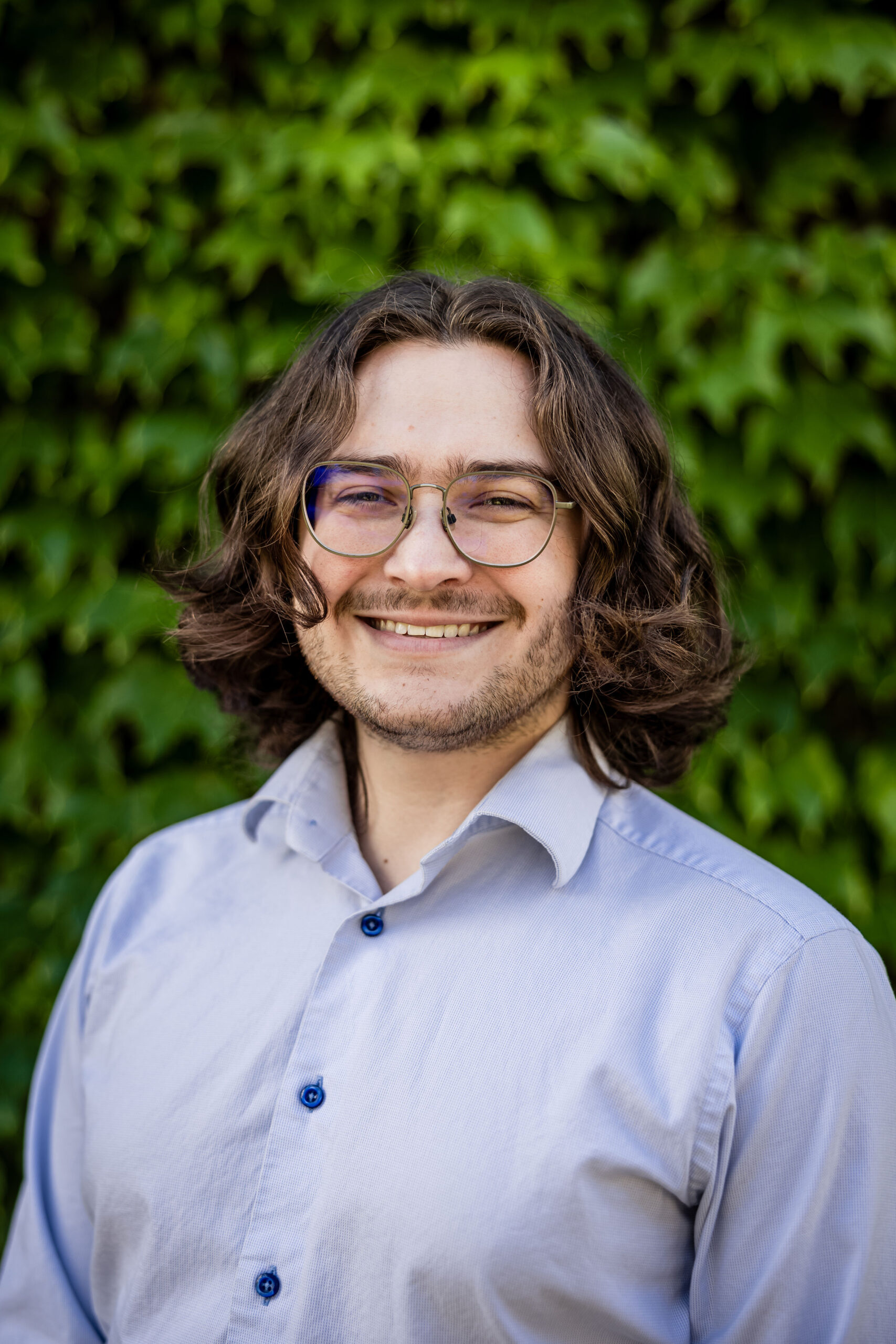
On-slide embedding of Caenorhabditis elegans for quantitative laser ablation inductively coupled plasma time-of-flight (LA-ICP-TOF) mass spectrometry imaging
Kavya Thaker, B.A. in Molecular Biology, Kenyon College, May 2025
Undergraduate Research Assistant, Department of Biology, Kenyon College

Characterizing chemosensation defects in NFU1/NFU-1 mutants in a Caenorhabditis elegans model of Multiple Mitochondrial Dysfunction Syndrome I
Ian Weigle, B.S.
Ph.D. Candidate, University of Chicago
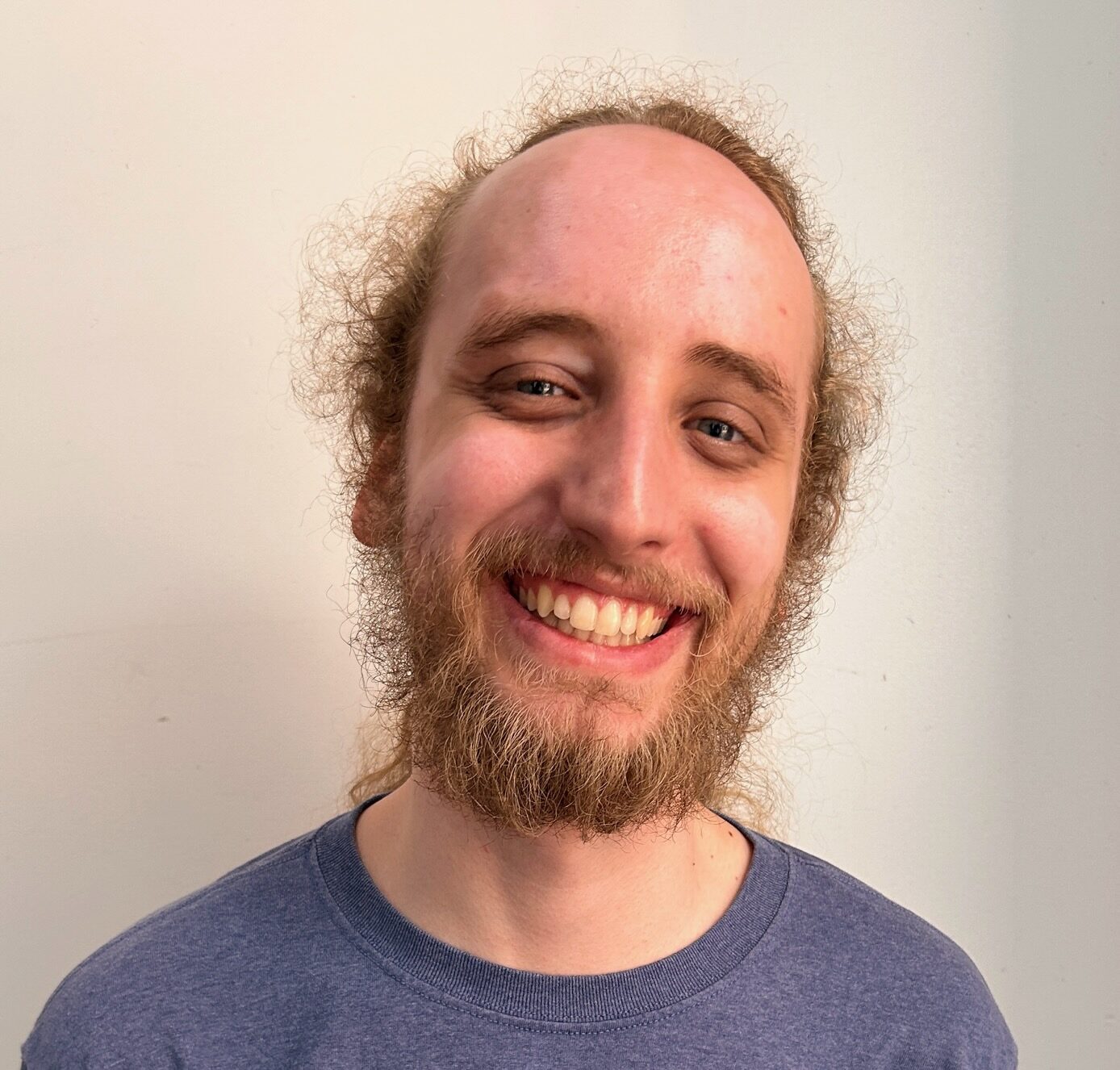
Deciphering motor neuron vulnerability in C9ORF72 ALS by developing novel C. elegans models
Break
Session Three
3:30 pmJordan Jesse, B.S.
Graduate Student, University of Illinois Chicago College of Medicine
The PP2A complex, the scaffold RACK1, and 14-3-3 proteins interact with EXC-4/CLIC to regulate excretory canal outgrowth
Galayna Baur, B.S.
Graduate Student, Missouri University of Science and Technology
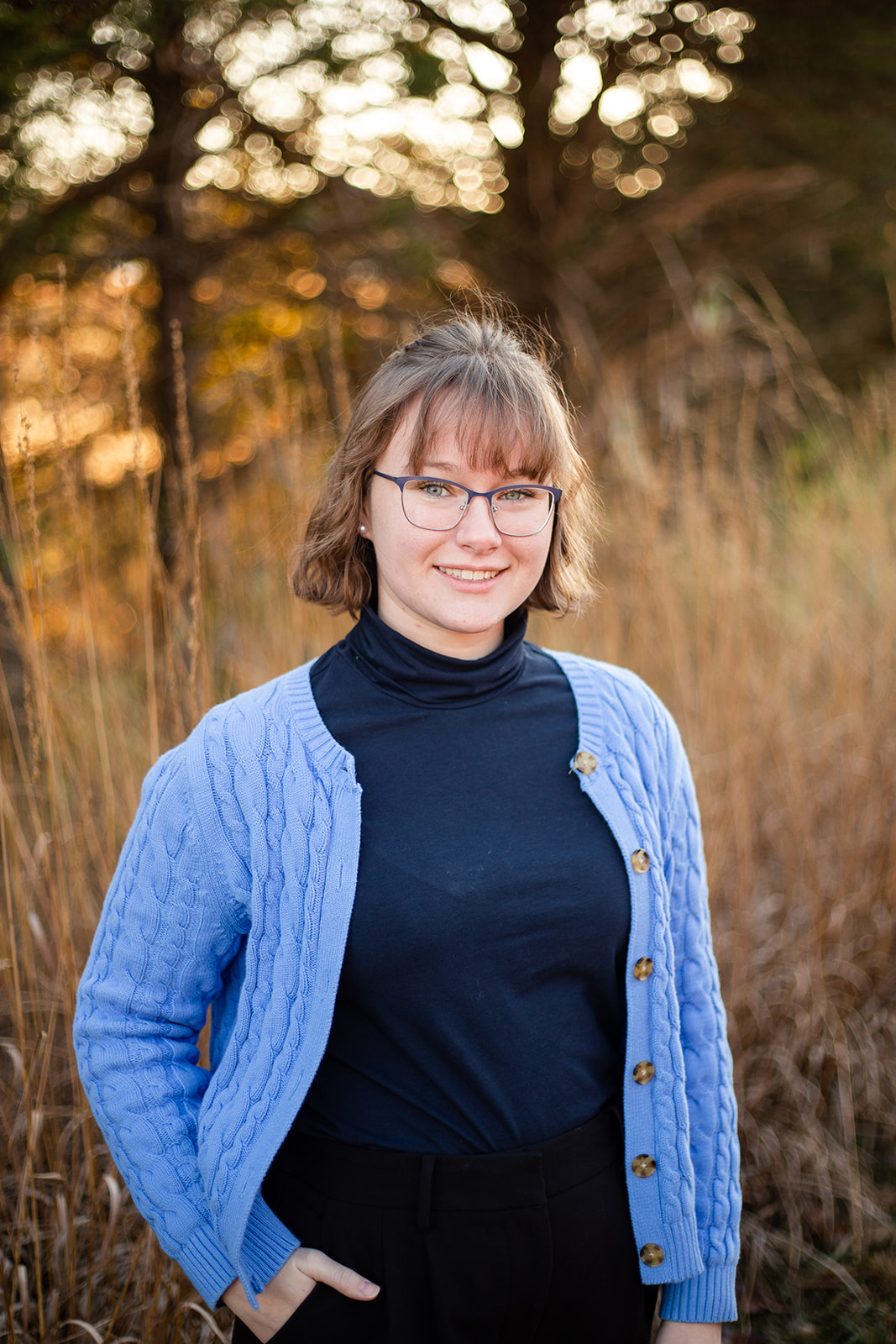
Are dauers ruling C. elegans populations?
Chika Fujii
Graduate Student, Washington University

The SSR1 domain is important for nematode virus infection
Shane Kowaleski, B.S.
Graduate Research Assistant, Wayne State University School of Medicine

Cytoplasmic kinetochore linear elements regulate vesicle transport
Closing Remarks and Award Presentation
Graduate Student, Missouri University of Science and Technology
Galayna Baur is a master’s student in Dr. Andrea Scharf’s lab at the Missouri University of Science and Technology, where she also earned her bachelor’s in biological sciences with a chemistry minor in December 2024. During her undergraduate studies, Galayna worked on various research projects, including investigating population dynamics, pheromone signaling and the dauer developmental stage under Dr. Scharf. She is continuing this research in her graduate studies to explore developmental plasticity and its evolutionary implications.
In addition to her work with Dr. Sharf, Galayna collaborated with Dr. Stanely on a project between the Computer Science Department and The Dermatology Center, where she helped annotate images to train an AI for melanoma detection. This involved using Paint.NET, understanding deep learning algorithms and training AI models. Galayna was also a member of the iGEM team, further cultivating her interests in genetics and molecular biology.
Graduate Student, Washington University
Chika is a graduate student in Dr. David Wang’s lab in the Molecular Microbiology Department at Washington University. Prior to joining Dr. Wang’s lab, she completed her undergraduate studies at Davidson College in North Carolina. In the Wang lab, Chika leverages the C. elegans–Orsay virus experimental model to address fundamental questions centered around host-virus interactions. By integrating approaches in genetics, genomics and molecular virology, her work aims to identify evolutionarily conserved host factors that influence viral infection. This interdisciplinary approach allows her to uncover fundamental mechanisms of host defense with potential implications for broader virology research.
Ph.D. Candidate, University of Michigan
Mirella Hernandez is a Ph.D. candidate in the Neuroscience Graduate Program at the University of Michigan. She earned her bachelor of arts in Biopsychology at California State University San Bernardino (CSUSB). As an undergraduate student at CSUSB, she was accepted into the NIH-funded Diversity-promoting Institutions Drug Abuse Research Program (DIDARP). This fellowship was extremely influential in her research training. Her current graduate thesis project explores the relationship between environmental cues and their impact on lifespan and healthspan.
Graduate Student, University of Illinois Chicago College of Medicine
Jordan graduated from Truman State University with B.S. degrees in Biology and Chemistry. He then worked in several academic and commercial laboratories before joining the Shaye Lab in 2022 as a graduate student in the GEMS program at UICCOM. His current research focuses on signaling pathways regulating tube formation in C. elegans and angiogenic behaviors in human cells in vitro. He was awarded the NLHBI–funded Vascular Biology, Signaling, and Therapeutics training grant (T32) in 2022, and won the first-place poster award at the 2024 GEMS Research Symposium.
Graduate Research Assistant, Wayne State University School of Medicine
Shane Kowaleski is a second year Ph.D. student in the Department of Pharmacology at Wayne State University School of Medicine. He graduated from the University of Detroit Mercy in 2022 with a bachelor’s degree in biology. He works in the lab of Dr. Joshua Bembenek and his current research focuses on how regulators of the cell cycle are involved in the organization of membrane-bound compartments during cell division.
Ph.D. Candidate, University of Michigan, Ann Arbor
Elizabeth is a Ph.D. candidate in the lab of Dr. Scott Leiser at the University of Michigan. In 2019, she graduated from the University of Minnesota-Twin Cities with degrees in Biochemistry and in Neuroscience. Next, Elizabeth started her Ph.D. in the Department of Molecular and Integrative Physiology at the University of Michigan, where she joined the Leiser Lab. Elizabeth is in the final year of her Ph.D., and her research focuses on understanding how the nervous system is involved in the regulation of aging as well as how peripheral metabolism feeds back to modify neural signaling.
Assistant Professor of Biology, Kenyon College
Peter Kropp received his Ph.D. from Vanderbilt University in Molecular Physiology and Biophysics in 2012 and he then moved to the National Institutes of Health for a postdoctoral fellowship with Andy Golden. It was at the NIH that Peter was trained in rare disease modeling in C. elegans. Building on his interest in the intersection of metabolism and development, Peter started modeling rare mitochondrial diseases to try to elucidate genotype-phenotype relationships of understudied mitochondrial pathways. Peter’s postdoc work has fueled research in his own lab at Kenyon College where he joined the faculty in 2022. His lab continues to work on rare mitochondrial diseases with a focus on MEPAN syndrome and Multiple Mitochondrial Dysfunctions Syndrome 1. His lab uses a diversity of techniques, from the molecular to the behavioral, to understand the causes and consequences of mitochondrial dysfunction. Peter has had the privilege of mentoring 12 undergraduates in his lab to date and sharing the joys of worms with them. In 2024, Peter was appointed to the Harvey F. Lodish Faculty Development Chair in the Natural Sciences.
Assistant Professor, The George Washington University
Dr. Vladimir Lažetić earned his DVM through a combined B.S./M.S. program at the University of Belgrade, Serbia, where he conducted research in parasitology. He completed his Ph.D. at the University of Wyoming in the lab of Dr. David Fay, investigating the role of NIMA-related kinases in C. elegans development. For his postdoctoral research, Dr. Lažetić joined Dr. Emily Tromel’s lab at UC San Diego, where he studied the genetic regulation of the intracellular pathogen response (IPR), a protective immune program in C. elegans. His work led to the discovery of ZIP-1, the first known antiviral transcription factor in nematodes, and identified other key IPR regulators. Now an Assistant Professor at The George Washington University, Dr. Lažetić leads research on the transcriptional and epigenetic control of immune and stress responses. His recent work highlights a role for conserved chromatin regulators in repressing immunity to intracellular pathogens. His lab also investigates how changes in microbiome composition and nutrition influence innate immunity in C. elegans.
Graduate Student, Department of Biological Sciences, Wayne State University
Bianca Pereira came to the U.S. in the fall of 2016 from India to continue her research studies. She completed her undergraduate degree in India and her M.Sc. degrees in Biotechnology from the University of Bath, UK, and Wayne State University, Detroit, Mich. She is now pursuing a Ph.D. degree in Biological Sciences from Dr. Alcedo’s lab at Wayne State University, where she studies the neuronal regulation of reproductive growth in C. elegans. Her overall research interest has centered around understanding the mechanisms that underlie the molecular and cellular bases of neurological and physiological disorders. Outside the lab, she finds outreach programs, music and simple hikes enriching. Her goal is to live a life full of purpose and to merit the opportunities she receives.
Ph.D. Candidate in Analytical Chemistry, Qiu Lab, Michigan State University
Aidan received his Bachelor of Science in biochemistry from Ferris State University where he spent his time conducting research in organic synthesis and drug discovery within the Kurup Lab at the College of Pharmacy. Shortly after graduation, he was hired into the Michigan State University Veterinary Diagnostic Lab in the nutrition and toxicology department as a laboratory technologist. Aidan transitioned from his position at the Veterinary Diagnostic Laboratory to the MSU Chemistry Ph.D. program after 15 months of employment in the hopes that he could further advance his education in analytical chemistry and toxicology. He is currently finishing his third year of his Ph.D. in analytical chemistry within the Qiu Lab at Michigan State University. His research focuses on developing mass spectrometry imaging methods for toxicology research using Caenorhabditis elegans and mice. His work also focuses on imaging environmental contaminants in biological systems including per- and polyfluoroalkyl substances (PFAS), heavy metals, and metal-based nanoparticle technology.
Professor, Boyce Thompson Institute and Cornell University
Prof. Schroeder studied chemistry and physics at the University of Hamburg, where he worked with Prof. Wittko Francke, identifying structures and functions of insect-derived natural products. Schroeder continued to develop new approaches toward characterizing biological small molecules as a postdoc with Jerrold Meinwald at Cornell University and later Jon Clardy’s group at Harvard Medical School as the Director of the Natural Products Initiative, where he discovered C. elegans as a model system for small molecule signaling and biochemistry. Schroeder started his own lab at BTI/Cornell University in 2007.
Research in the Schroeder lab is dedicated to facilitating a systematic structural and functional annotation of biogenic small molecules (BSMs) in model organisms, integrating expertise in molecular biology, bioinformatics, and chemistry. BSMs play central roles as information carriers in diverse biological processes and represent the most important resource for new drug leads, e.g., the treatment of metabolic disease and cancer. Moreover, detailed knowledge of small-molecule structures, their biosynthetic pathways, and their interactions with other biomolecules is essential for advancing our understanding of endocrine and exocrine signaling pathways.
Combining comparative metabolomics with phenotypic screens and genetic approaches, we have engaged in a comprehensive effort to characterize the metabolome (the entirety of all BSMs) produced by the model organism Caenorhabditis elegans, focusing on metabolites that control development, aging, and social behaviors. Encouraged by the success of our methods in the model system C. elegans, we have started a parallel effort to investigate tissue-specific differences in mammalian metabolomes, including changes in response to alteration of the composition of the gut microbiome. These studies indicate that mammals employ similarly extensive small molecule-based signaling networks that rely to a significant extent on not yet annotated BSMs.
Undergraduate Research Assistant, Department of Biology, Kenyon College
Kavya Thaker is a senior at Kenyon College pursuing a Bachelor of Arts in Molecular Biology with a concentration in Public Policy. Over the past two and a half years, she has been a research assistant in Dr. Peter Kropp’s lab studying Multiple Mitochondrial Dysfunction Syndrome I, a rare mitochondrial disorder, using a C. elegans model. Her research focuses on understanding how mitochondrial dysfunction impacts chemosensation to uncover broader disease mechanisms. She was also selected for the Pelotonia Research Program at The Ohio State University’s Center for Cancer Health Equity, where she analyzed the impact of long COVID on Ohio’s minority and vulnerable populations under the mentorship of Dr. Electra Paskett. Kavya’s future goals include advancing her research skills while integrating epidemiological and population health approaches to address complex challenges posed by diseases.
Ph.D. Student, Van Andel Institute Graduate School
Xiao Wang completed his bachelor’s degree in clinical medicine at Guangxi Medical University, including a one-year clinical internship. He had investigated novel biomarkers for cancer diagnosis and treatment, especially for hepatocellular carcinoma (HCC) and prostate cancer (PCa), using bioinformatics and next-generation sequencing analysis. His research interests include identifying novel biomarkers for cancer diagnosis and treatment, assessing interactions between biomarkers and their interactors, and further elucidating the molecular mechanisms that link biomarkers and cancers.
Ph.D. Candidate, University of Chicago
Ian Weigle is a Ph.D. candidate in the Neurobiology program at the University of Chicago. Ian began his scientific career at Southern Illinois University Carbondale, earning a bachelor’s degree in Physiology. Before graduate school, Ian worked as a research technician in Dr. Sangram Sisodia’s lab at the University of Chicago, studying the role of the gut microbiome in Alzheimer’s disease using transgenic mouse models. During this time, he contributed to multiple peer-reviewed publications, including two second-author manuscripts. Now a graduate student in Dr. Paschalis Kratsios’s lab at UChicago, Ian investigates selective neuronal vulnerability in amyotrophic lateral sclerosis (ALS), using C. elegans to study how G4C2 repeat expansions in C9ORF72 drive motor neuron degeneration. Ian’s research combines molecular genetics, confocal microscopy, and behavioral analysis to identify key factors contributing to neurodegeneration in ALS.
Poster abstracts may be submitted during registration. Please indicate if you would like your abstract to be considered for an oral presentation. If you plan to participate in the poster session but do not want to be considered for an oral presentation, please select the “poster session” option during registration. The deadline for poster abstracts is March 3, 2025.
For questions, please contact Courtney Zirkle.
Abstract format
Submitted abstracts should represent original research. The title should be brief and descriptive, and the body should include rationale, methods and results. Please prepare abstracts using the below template.
Poster dimensions
Posters should be 60 in. x 40 in. Pushpins will be provided.
Questions?
Questions regarding abstract submission, posters, or the poster session can be directed to Courtney Zirkle.
TITLE OF ABSTRACT IN ALL CAPS (STYLE = TITLE)
Presenting Author1,2, Other Author1, and Last Author1,3 (Style = Authors)
1First Dept., Institution, City, State, Country, 2Second Dept., Institution, City, State, Country, and 3Last Dept., Institution, City, State, Country (Style = Affiliations)
Body of abstract using 300 words or less. Define each abbreviation at first use. All fonts should be Arial, 11 pt. and text should be single-spaced. Once you have filled in this template, choose File>Save As and save your file as a Word document (.doc or .docx) with the filename lastname_abstract. (Style = Body)
EXAMPLE
A MOTHER TO OFFSPRING METABOLIC LINK
Nick Burton1
1Department of Metabolic and Nutritional Programming, Van Andel Institute, Grand Rapids, MI, United States
Lorem ipsum dolor sit amet, consectetur adipiscing elit, sed do eiusmod tempor incididunt ut labore et dolore magna aliqua. Ut enim ad minim veniam, quis nostrud exercitation ullamco laboris nisi ut aliquip ex ea commodo consequat. Duis aute irure dolor in reprehenderit in voluptate velit esse cillum dolore eu fugiat nulla pariatur. Excepteur sint occaecat cupidatat non proident, sunt in culpa qui officia deserunt mollit anim id est laborum.
Assistant Professor, Department of Metabolism and Nutritional Programming
Van Andel Institute
Dr. Nick Burton explores how our environment, especially microbes, can impact our health and the health of our offspring — even before they are born. His research has extensive implications for understanding how epigenetics contributes to human disease and how the environment we are exposed to today affects not only our own health, but also our children’s.
Assistant Professor, Department of Biological Sciences at Missouri S&T
Dr. Andrea Scharf specialized in the study of aging as a life history trait and its impact on population dynamics. Her lab integrates cellular, organismal, and population-level biology to uncover the mechanisms driving life history traits like aging, with a focus on (1) the impact of aging on population dynamics, (2) premature aging induced by environmental factors, and (3) inter-individual communication of environmental effects within populations.
When and where is the 2024 Midwest C. elegans Meeting?
The meeting will be held April 18, 2025, at Van Andel Institute in Grand Rapids, Michigan.
Is there a cost to register?
There is no cost to attend. Registration is required.
Can I register a group?
Yes, the registration form allows one person to register for a group. Once registration is complete for one person, please click “add person” in the bottom right corner of the form. Input the second person’s information and continue in this manner until all parties in the group are registered.
Where do I park?
There is metered parking around VAI as well as several parking garages. Please see the link below for parking options.
Parking near Van Andel Institute.
What if I need accessible parking?
Please contact Courtney Zirkle to discuss any accessibility needs.
Event Details
Contact Info:
Email: Courtney Zirkle